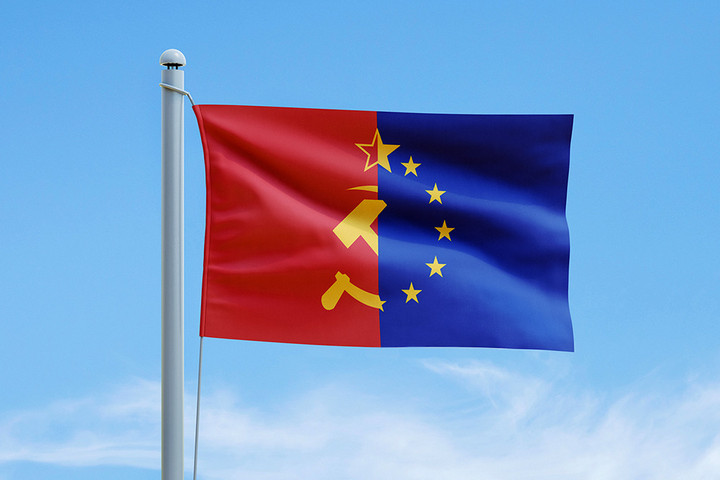A formidable similarity, and even identity more than once, can be discovered between the former Soviet Union and the European Union. The structural structure and goals of the two unions, including the abolition of nation-states, stem from one and the same ideological foundation
Perhaps Vladimir Bukovsky's comparative analysis of the similarities between the former Soviet Union and the European Union has never been more relevant than now, after the Qatar-gate bribery scandal broke out. It was recently revealed that several Brussels leaders, including Eva Kaili, the Greek Socialist Vice-President of the European Parliament, accepted significant sums of money from Qatar and Morocco in order for the EU to make decisions favorable to the two Arab countries.
Bukovsky, once the best-known Soviet dissident, who visited several prisons and labor camps as well as psychiatric institutes in the former empire, and was then able to leave for Great Britain as part of a prisoner exchange, before his death in 2019, dealt with the illusion he harbored towards the West. Among other things, he saw that the former Soviet Union, with all its faults, lives on in the European Union.
According to the former Soviet oppositionist, corruption deeply permeated the Soviet system, from the highest level to the lowest. An example here, as Magyar Hírlap already wrote, is the case of Oleg Pennkovsky, who worked as a military attaché at the Soviet embassy in Ankara in the late fifties and performed intelligence tasks. He reported his direct boss in Istanbul to his superiors in Moscow, saying that he embezzled money. But since the corruption in the Soviet system was planned and at the system level, the case was not investigated, but Pennkovsky was called home and put aside. Because, theoretically, corruption could not exist in the Soviet Union.
The Qatar-gate that broke out in the EU also proves that corruption in Brussels is systemic and not an isolated case. It is hard to imagine that no one in the Brussels bubble knew anything, since even the fact that the two Arab countries were being favored by the EU bosses could have raised suspicions. Corruption is also planned in the EU. It is enough to look only at the activities of Olaf Scholz, mayor of Hamburg. The left-wing German chancellor is still being prosecuted on suspicion of tax evasion, because during his reign in Hamburg, the city administration paid 47 million euros in tax refunds to the Warburg banking house. And how interesting that in 2017 Warburg donated 45,000 euros to Scholz's party, the local organization of the Social Democratic Party.
Let's not forget Ursula von der Leyen's highly suspected cases of corruption either. The president of the European Commission was able to bring Pfizer and BioNTech extra profits of tens of billions of euros with amazingly overpriced vaccine purchases. After the contracts were signed, Ursula von der Leyen's husband suddenly became the medical director of one of Pfizer's partner companies. The text messages related to the whole affair "accidentally" disappeared from Von der Leyen's phone.
If we compare the internal structure of the two unions, we discover a striking similarity. The Soviet Union was run by 15 people, never elected by anyone, members of the political committee of the Communist Party, they appointed each other to the positions, they were not accountable to anyone. The European Union is led by 25 commissioners, also never elected by anyone, members of the European Commission, and they are also not accountable to anyone, and they cannot be replaced either. The common feature of the Soviet and Brussels bodies is that a significant part of their decisions and evaluations are not public. Just a recent example from Brussels.
Christopher Davis, a professor at the University of Oxford, recently revealed in an interview with Magyar Hírlap that Brussels prepared a secret study, the content of which was not shared with EU citizens. According to E, the sanctions decisions against Russia were made too quickly, and all of this was done under political pressure, and there was no prior economic impact study. The EU did not make any plan about the impact of the sanctions, it decided randomly.
In an ideological sense, the similarity between the Soviet and Brussels systems is even more striking, but perhaps in this case it is more appropriate to speak of identity. The goal of the Soviet Union was to create a new historical community, the "Soviet people", the "socialist type of man". Everyone was indoctrinated to forget their nationality, traditions and customs. The European Union does not want to see Frenchmen, Germans, Hungarians, Poles, etc. either. He wants a new historical community to be created, everyone to be European, suppress all national feelings and live in a multinational community.
The main goal of the Soviet Union was the liquidation of nation-states. And now the European Union is doing exactly the same. Brussels is trying to absorb the nation-states so that they don't exist anymore. The Soviet Union wanted to build a federal state, the EU's intention is no different, it wants to create the United States of Europe.
And now we come to the issue of violence. In the Soviet Union and the vassal states, the so-called socialist system was often maintained by military means, that is, by force. Hungary, 1956, Czechoslovakia 1968, Poland 1981. The European Union does not use military force - there are no such formations - but the threat of financial withdrawals, for example, can be called violence. In the case of Hungary, the restoration funds, which are due to all member states, were tied to some kind of rule of law conditions - we don't even know today what this is based on. Or, in the case of Poland, to a fairly vague judicial reform. Here, it's not just the horse's leg that sticks out, but the whole horse as well. Both countries pursue a conservative, patriotic, Christian policy. Well, Brussels doesn't want to see that.
And then what did Ursula von der Leyen, the president of the European Commission, say before the Italian elections, if the result does not go according to the taste of Brussels: We have the means, we have already proven this in the case of Hungary and Poland.
The Soviet Union had the Gulag. Among others, those who did not agree with the Soviet system and voiced it were sent to these penal camps. The European Union also has a Gulag. An intellectual Gulag called political correctness. If anyone speaks up and their views differ from the mainstream, they are immediately ostracized, made impossible, and ridiculed. The person is fired from his job, after that he cannot pay his loans, he loses his apartment, his car, his child is expelled from school because of tuition arrears. The loss of freedom begins with the establishment of the Gulag system.
Bukowski's conclusion in short: Like the Soviet Union, the European Union will collapse, leaving enormous political, economic and social damage behind.
Author: Péter G. Fehér
Source: magyarhirlap.hu












